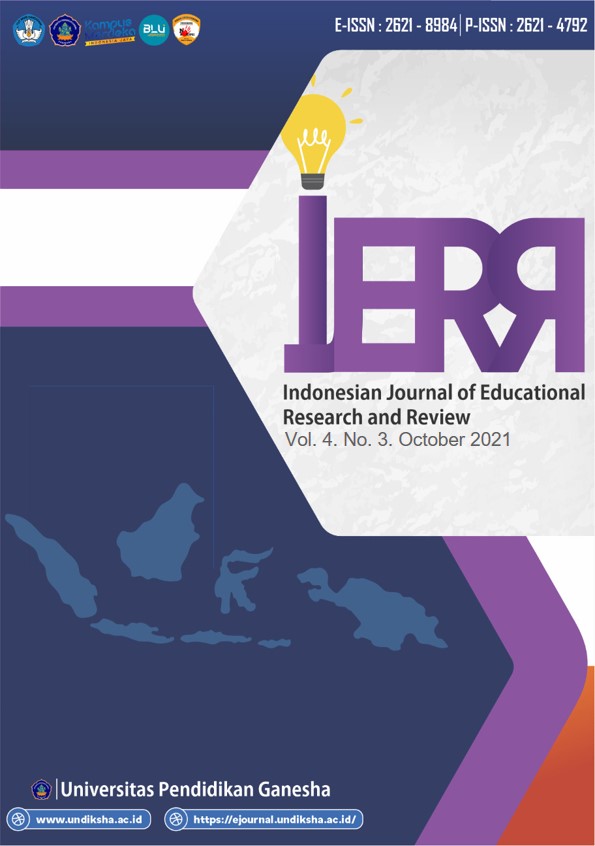Using Movement Activities in Engaging Young Learners
DOI:
https://doi.org/10.23887/ijerr.v4i3.42271Keywords:
movement activities, engaging, young learnersAbstract
Activities including movements can make young learners understand something through their five senses. However, instead of accommodating them to learn physically, most of the teachers often tell young learners to stay still on their seat. Therefore, this article investigated on how movement activities can be used by the teachers to engage the young learners at school. In this study, library research method was conducted in collecting the data which is also analyzed by the researcher. Teaching young learners is not as easy as it seems. One of their characteristics is they like to learn through movement activities which can be done by seeing, hearing, touching and interacting with something. Unfortunately, this characteristic also can be a problem for teacher to engage them in the classroom activity since they can be easily distracted over things that they are curious about. There is one thing that the teacher could implement to make the students engage in the class which is by using movement activities. Instead pushing the students to stay still and keep silence, it is better to make use or utilize their characteristic as a way to learn. Some activities which are including movements like music or singing a song and playing games with some physical moves, total physical response activities, and some other activities which involve coloring, cutting, sticking, and any other movements activities could be done by the teacher inside or outside the classroom.
References
Alhassan, A. (2019). Investigating business EFL postgraduate student writing in a UK university: a qualitative study. Cogent Education, 6(1). https://doi.org/10.1080/2331186X.2019.1699741.
Artini, L. P. (2017). Rich Language Learning Environment and Young Learners’ Literacy Skills in English. Lingua Cultura, 11(1), 19–24. https://doi.org/10.21512/lc.v11i1.1587.
Bedir, H. (2019). Pre-service ELT teachers’ beliefs and perceptions on 21st century learning and innovation skills (4Cs). Journal of Language and Linguistic Studies, 15(4), 231–246. https://doi.org/10.17263/jlls.547718.
Börekci, R., & Aydin, S. (2020). Foreign language teachers’ interactions with their students on Facebook. Computer Assisted Language Learning, 33(3), 217–239. https://doi.org/10.1080/09588221.2018.1557691.
Dizon, G. (2016). A comparative study of Facebook vs. paper-and-pencil writing to improve L2 writing skills. Computer Assisted Language Learning, 29(8), 1249–1258. https://doi.org/10.1080/09588221.2016.1266369.
Edwards, L. C., Bayless, K. M., & Ramsey, M. E. (2005). Music, a Way of Life for the Young Child 5th Edition. Pearson College Div; 5th edition.
Erdogan, V. (2019). Integrating 4C Skills of 21st Century into 4 Language Skills in EFL Classes Vacide Erdoğan. International Journal of Education and Research, 7(11), 113–124.
Garton, S., & Fiona, C. (2018). The Routledge handbook of teaching English to young learners. Routledge. https://doi.org/10.4324/9781315623672.
Gilje, T. M. (2014). Teacher Cognition and The Teaching of EFL Reading in Norwegian Upper Primary Classrooms. Acta Didactica Norge, 8(2), 1–17. https://doi.org/10.5617/adno.1141.
Hamzah, A. (2019). Metode Penelitian Kepustakaan: Kajian Filosofis, Teoretis, dan Aplikatif. Literasi Nusantara.
Kimsesiz, F. (2017). The Effect of Project Based Learning in Teaching EFL Vocabulary to Young Learners of English: The Case of Pre-School Children. Online Submission, 5(4), 426–439. https://eric.ed.gov/?id=ED581572.
Lee, I., & Coniam, D. (2013). Introducing assessment for learning for EFL writing in an assessment of learning examination- driven system in Hong Kong. Journal of Second Language Writing, 22(1), 34–50. https://doi.org/10.1016/j.jslw.2012.11.003.
Lichtman, M. (2013). Qualitative Research in Education (3rd ed.). SAGE Publications.
Muqarramah. (2016). Pendekatan Student Centered Learning ; Design Pembelajaran Aqidah Akhlak. Jurnal Tarbiyah (Jurnal Ilmiah Kependidikan), 5(2), 23–43. https://doi.org/10.18592/tarbiyah.v5i2.982.
Octaberlina, L. R., & Muslimin, A. I. (2020). EFL Students Perspective towards Online Learning Barriers and Alternatives Using Moodle/Google Classroom during COVID-19 Pandemic. International Journal of Higher Education, 9(6), 1. https://doi.org/10.5430/ijhe.v9n6p1.
Parvin, R. H., & Salam, S. F. (2018). The Effectiveness of Using Technology in English Language Classrooms in Government Primary Schools in Bangladesh. FIRE: Forum for International Research in Education, 2(1). https://doi.org/10.18275/fire201502011049.
Rahayu, V. W. T. (2016). Teachers’ Challenges in Teaching English to Young Learners in Rural Public Primary Schools in Salatiga. Universitas Kristen Satya Wacana.
Ratminingsih, N. M., Mahadewi, L., & Divayana, D. (2018). ICT-Based Interactive Game in TEYL: Teachers’ Perception, Students’ Motivation, and Achievement. International Journal of Emerging Technologies in Learning, 13(9), 190–203.
Sabirli, Z. E., & Coklar, A. N. (2020). The Effect of Educational Digital Games on Education, Motivation and Attitudes of Elementary School Students Against Course Access. World Journal on Educational Technology: Current Issues, 12(3), 175. https://doi.org/10.18844/wjet.v12i3.4993.
Savic, V. M. (2014). Total Physical Response (TPR) Activities in Teaching English To Young Learners. Физичка Култура И Модерно Друштво, Пос. Изд, Књ., 17(September), 447–454.
Scott, W. A., & Ytreberg, L. H. (2001). Teaching English to Children (14th Ed.) (14th ed.). Longman.
Sugiyono. (2014). Metode Penelitian Pendidikan Pendekatan Kuantitatif, Kualitatif, dan R&D. Alfabeta.
Tiwery, S. D. (2019). Inside-Outside Circle As the Way in Building Students’ Motivation and Interaction in Speaking Classroom Activities. International Journal of Language Education, 1(1), 33. https://doi.org/10.26858/ijole.v1i1.6703.
Vo, L. T., & Nguyen, H. T. M. (2020). Critical friends group for EFL professional development. ELT Journal, 64(2), 205–213. https://doi.org/10.1093/elt/ccp025.
Downloads
Published
How to Cite
Issue
Section
License
Authors who publish with the Indonesian Journal of Educational Research and Review (IJERR) agree to the following terms:
- Authors retain copyright and grant the journal the right of first publication with the work simultaneously licensed under a Creative Commons Attribution-ShareAlike 4.0 International License. that allows others to share the work with an acknowledgment of the work's authorship and initial publication in this journal.
- Authors are able to enter into separate, additional contractual arrangements for the non-exclusive distribution of the journal's published version of the work (e.g., post it to an institutional repository or publish it in a book), with an acknowledgment of its initial publication in this journal.
- Authors are permitted and encouraged to post their work online (e.g., in institutional repositories or on their website) prior to and during the submission process, as it can lead to productive exchanges, as well as earlier and greater citation of published work. (See The Effect of Open Access)









